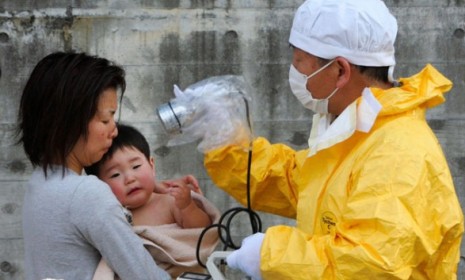Japan's nuclear disaster: Is the worst over?
Dozens of Japanese workers have risked their lives trying to ward off a total nuclear meltdown. And now the crisis appears to be stabilizing

A free daily email with the biggest news stories of the day – and the best features from TheWeek.com
You are now subscribed
Your newsletter sign-up was successful
Energy officials from the U.S. and other nations are cautiously optimistic about the situation at Japan's failing Fukushima Daiichi power plant nuclear reactors. U.S. Energy Secretary Steven Chu said Sunday that while we have incomplete information, it appears that "with each passing hour, each passing day, things are more under control." After all the fears of a total nuclear meltdown at the Fukushima reactors, has Japan started to get things under control? Here, a brief guide.
What is the good nuclear news from Japan?
Fukushima operator Tokyo Electric Power (Tepco) has been able to restore electricity at three of the six reactors, and hopes to get the cooling pumps working within days. In the meantime, efforts to keep the reactors and pools of spent nuclear fuel rods from overheating by dousing them with fire hoses and helicopter drops of seawater "appear to have created a modicum of stability," The Wall Street Journal reports. Also, radiation levels at the plant seem to be dropping.
The Week
Escape your echo chamber. Get the facts behind the news, plus analysis from multiple perspectives.

Sign up for The Week's Free Newsletters
From our morning news briefing to a weekly Good News Newsletter, get the best of The Week delivered directly to your inbox.
From our morning news briefing to a weekly Good News Newsletter, get the best of The Week delivered directly to your inbox.
How about the bad news?
There might be a radiation leak in reactor No. 2, large radiation clouds could still be released, and radioactive contamination has been found in Japanese spinach, drinking water, and milk. Government spokesman Yukio Edano says he thinks the radiation levels in the food, while above Japanese legal limits, are safe for human consumption. But Japan warned people within the 20-mile contamination zone to stay inside, wear masks and long sleeves, and not drink tap water.
Who is still battling the meltdown?
Soldiers from Japan's Self Defense Force and Tokyo firefighters are helping to douse the reactors and fuel-rod pools, and the "Fukushima Fifty" have been joined by hundreds of other technicians apparently willing to risk death to prevent another Chernobyl. "It is just amazing how the workers continue this mission while knowing what sort of impact it may have on their health," said one nuclear safety agency official.
A free daily email with the biggest news stories of the day – and the best features from TheWeek.com
Should we breathe sighs of relief?
The situation at Fukushima "remains very serious," says International Atomic Energy Agency chief Yukiya Amano, but "I have no doubt that this crisis will be effectively overcome." That's good news for the rest of the world, but probably only small comfort to the Japanese, says Matthew Herper at Forbes. The nuclear fallout threat was, after all, "less risky than you might expect" from the news reports. But "other problems — like lack of medical care, shelter, and water" — are still life-and-death issues for thousands of people who survived Japan's earthquake, tsunami, and nuclear crisis.
Sources: Bloomberg, The Hill, BBC News, Forbes, Wall Street Journal, CNN, AFP, National Geographic, Reuters
-
 Witkoff and Kushner tackle Ukraine, Iran in Geneva
Witkoff and Kushner tackle Ukraine, Iran in GenevaSpeed Read Steve Witkoff and Jared Kushner held negotiations aimed at securing a nuclear deal with Iran and an end to Russia’s war in Ukraine
-
 What to expect financially before getting a pet
What to expect financially before getting a petthe explainer Be responsible for both your furry friend and your wallet
-
 Pentagon spokesperson forced out as DHS’s resigns
Pentagon spokesperson forced out as DHS’s resignsSpeed Read Senior military adviser Col. David Butler was fired by Pete Hegseth and Homeland Security spokesperson Tricia McLaughlin is resigning